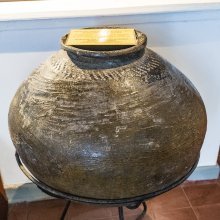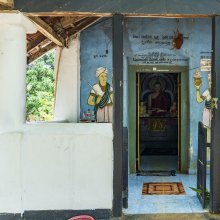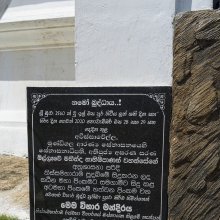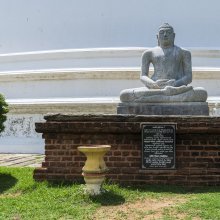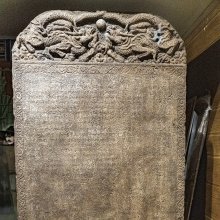Em: 3 definitions
Introduction:
Em means something in Hinduism, Sanskrit, biology, Tamil. If you want to know the exact meaning, history, etymology or English translation of this term then check out the descriptions on this page. Add your comment or reference to a book if you want to contribute to this summary article.
Images (photo gallery)
Biology (plants and animals)
Source: Google Books: CRC World Dictionary (Regional names)1) Em in India is the name of a plant defined with Chenopodium album in various botanical sources. This page contains potential references in Ayurveda, modern medicine, and other folk traditions or local practices It has the synonym Atriplex alba Scop. (among others).
2) Em is also identified with Chenopodium hederiforme It has the synonym Botrys albus Nieuwl. (etc.).
3) Em is also identified with Chenopodium olukondae It has the synonym Chenopodium opulifolium subsp. oluhondae Murray (etc.).
4) Em is also identified with Chenopodium opulifolium It has the synonym Chenopodium album subsp. opulifolium (Schrad. ex W.D.J. Koch & Ziz) Maire (etc.).
5) Em in Mexico is also identified with Zea mays It has the synonym Mays zea Gaertn. (etc.).
Example references for further research on medicinal uses or toxicity (see latin names for full list):
· Nova Acta Regiae Societatis Scientiarum Upsaliensis (1815)
· Newslett. Int. Organ. Pl. Biosyst. (Oslo) (1997)
· Acta Horti Gothoburgensis (1933)
· Medical Flora (1830)
· Repertorium Specierum Novarum Regni Vegetabilis (1928)
· Institutiones Rei Herbariae (1766)
If you are looking for specific details regarding Em, for example pregnancy safety, extract dosage, chemical composition, health benefits, side effects, diet and recipes, have a look at these references.

This sections includes definitions from the five kingdoms of living things: Animals, Plants, Fungi, Protists and Monera. It will include both the official binomial nomenclature (scientific names usually in Latin) as well as regional spellings and variants.
Languages of India and abroad
Sanskrit dictionary
Source: Cologne Digital Sanskrit Dictionaries: Edgerton Buddhist Hybrid Sanskrit DictionaryEm (एम्).—adv. (= AMg. id., chiefly before eva; MIndic for Sanskrit evam), thus, so; only in verses: chiefly before eva, Saddharmapuṇḍarīka 89.11 (most mss.); 99.2; 127.9; 197.9; 213.7; 313.11; rare in Lalitavistara and Mahāvastu and app. never in their mss., but required by meter Lalitavistara 371.7 and Mahāvastu i.119.18 (see Senart's note); 234.1; 298.5; common in Kāśyapa Parivarta, em eva 30.7; 31.6; 34.6; 36.7; 49.7 etc.; em eṣa, required by meter Lalitavistara 420.9, 15 (text evam eṣa); once eṃ seems required by meter before a consonant, Daśabhūmikasūtra.g. 9(345).1 eṃ (text evaṃ) śruṇitva.
Sanskrit, also spelled संस्कृतम् (saṃskṛtam), is an ancient language of India commonly seen as the grandmother of the Indo-European language family (even English!). Closely allied with Prakrit and Pali, Sanskrit is more exhaustive in both grammar and terms and has the most extensive collection of literature in the world, greatly surpassing its sister-languages Greek and Latin.
Kannada-English dictionary
Source: Alar: Kannada-English corpusĒṃ (ಏಂ):—[interjection] = ಏ3.
--- OR ---
Ēm (ಏಮ್):—[interjection] an interjection used to express surprise, excitement, appreciation; etc.
--- OR ---
Ēm (ಏಮ್):—[pronoun] = ಏನು [enu].
Kannada is a Dravidian language (as opposed to the Indo-European language family) mainly spoken in the southwestern region of India.
See also (Relevant definitions)
Starts with (+329): Ema, Ema-tavancam, Emadanyi, Emai, Emai, Emairugi, Emaiya, Emajazua, Emaka iseget, Emakak, Emakanam, Emakaram, Emake, Emakinkaran, Emakutam, Emal, Emaleger, Emaleker, Emaler, Emali.
Ends with (+6466): A-pasaranem, Abadhakanem, Abalanem, Abandanem, Abhibhavanem, Abhilashanem, Abhimanacem Ghara Khalim Asatem, Abhimananem, Abhimantranem, Abhishekanem, Abhivyapanem, Abhogati Janem, Abhyasakhalimpadanem, Abhyasanem, Abru Gadyamvaruna Janem, Acambanem, Acanganem, Acaranem, Acata-khanem-masananta-janem, Acchadanem.
Full-text (+1218): Emperuman, Varendraketu, Anaviddhavarna, Cha-em-thai, Cha-em-thet, Patamgacara, Khua sa em, Emman, Vudagra, Badita, Sivaka, Empiratti, Pariprakasha, Empiran, Sarvadevagupta, Parishraddhah, Emmanai, Unmudhi, Avakattati, Shukrodana.
Relevant text
One of your search terms exceeds the minimun character amount per search term. This amount currently equals 2.
No search results for Em, Ēṃ, Ēm in any book or story.
